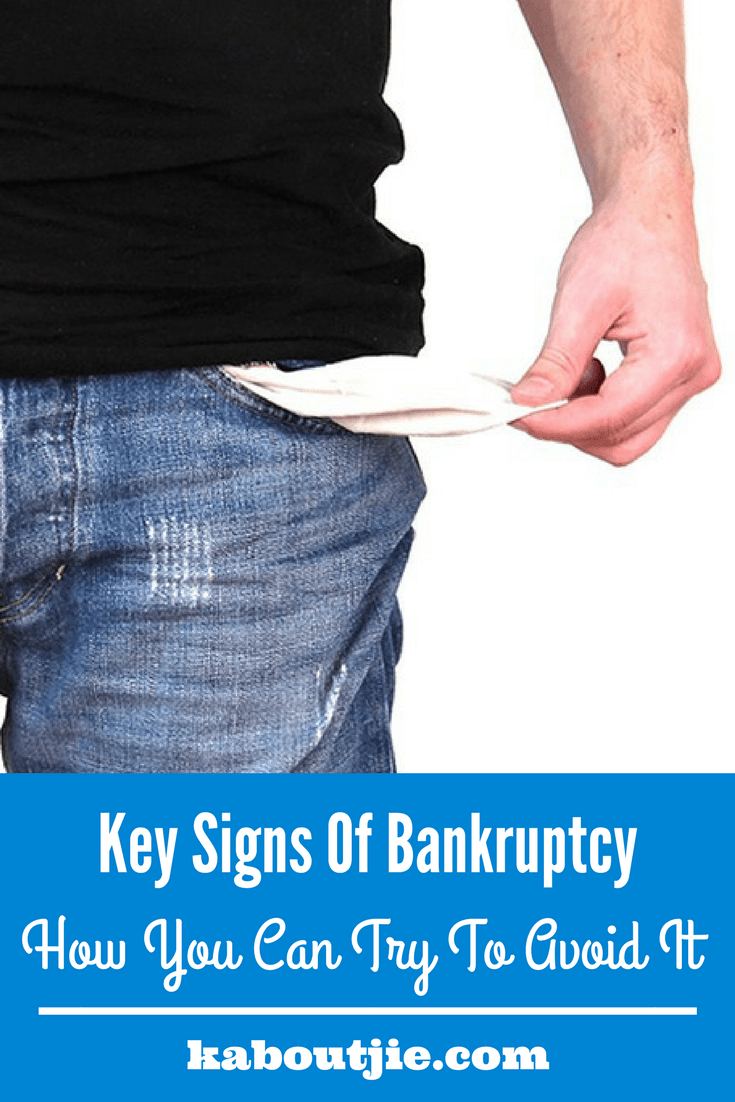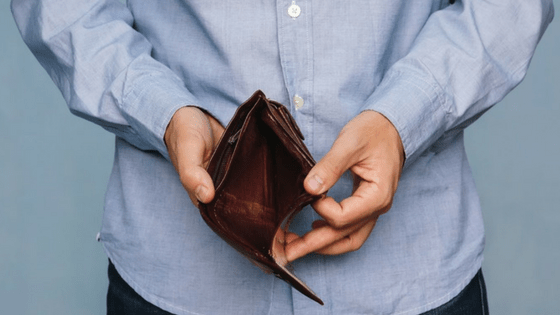When it comes to financial issues, “bankruptcy” can be part of the top ten. This is because bankruptcy in itself has a lot of negative connotations and consequences towards someone’s financial life. If you’ve heard of tales of bankruptcy filings from both individuals and corporations, you may have heard how difficult it is to rise back up from such a tricky situation. So what are the key signs of bankruptcy and how can you try to avoid it?
Numbers from the United States Courts indicate that a total of 794,960 bankruptcy filings were submitted throughout 2016, 490,365 of which were under Chapter 7, 7,292 under Chapter 11, 461 under Chapter 12, and 296,655 under Chapter 13. While these numbers may seem rather ordinary, they do imply that bankruptcy is in fact something that can happen to anyone.
This also means bankruptcy is something you can avoid. Here are key signs you should take note of, and how you can avoid these red flags:

Red Flag: Are You Failing To Meet Your Repayments?
When you qualify for debt, it’s an expectation that you should be able to eventually repay the debt back. However, if you start failing to meet these repayments, not only are you prolonging your state in debt, but you’re risking your credit status and getting further below debt.
- Not being able to pay repayments will reflect in your credit status, and failing to meet them entirely means your credit score will take a huge blow because of it. This means there’s a likelihood that you can’t qualify for other loans and other benefits.
- Solution: Perhaps it’s time to develop better habits at repaying debts. Try to make sure before you apply for a debt that you’re capable of meeting repayments, even with a bit of interest. Also adjust your financial lifestyle with your debt in tow, as this affords you room for less unnecessary spending and can put you into a mindset of clearing the debt first before anything else. A bankruptcy lawyer may also help you find better ways to avoid bankruptcy while being able to fulfill your repayment obligations.
Red Flag: Are You Becoming Inclined To Rely On High-Cost Loans?
A lot of loan options exist nowadays, and all can potentially be tailored towards your needs. In fact, some loans can be negotiated from the start, or renegotiated if you know there’s no way you can repay them because of particular circumstances. Your credit score, among other things, play a big role in ensuring that you can apply for loans, but if you’re starting to think about accepting high-cost loans, or if your only options are high-cost loans, then you have to rethink your financial lifestyle.
- If you’re starting to see the need to turn to vehicle title loans, payday loans, or other loans that have interest rates that amount to almost 200-percent or more, then bankruptcy might come knocking to your door.
- Solution: Before applying for a loan, consider assessing your financial situation carefully in order to ensure that the options you seek are something that can be realistically applied to your situation. It may also help to try asking for help from a bankruptcy lawyer if you do feel as though you need a move carefully-tailored to your needs.

Red Flag: Are You Using Your Credit Card To Buy Important Items?
Your credit card is a handy way of having something to pay for expenses without having to use cash, but if you’re starting to accumulate debt because your card is used to purchase important expenses, then you might find yourself in big trouble. This is because credit cards aren’t supposed to be used to pay even your basic bills, as this buries you further in debt.
- If you start paying for groceries, gas, or even basic commodities and utilities with your credit card, then you might steadily be burying yourself in debt with no way out. If you’ve maxed out your credit, and have no other means of paying your expenses, you’ll most likely have extreme difficulty making ends meet.
- Solution: If you do need a credit card loan, try your best to ensure that you use your loan only for things that are extremely important, and that you have a means to repay your credit card loan when needed. Try to start a savings account or try to allocate part of your income for savings if in case you have no means of paying for basic commodities because of a financial hurdle.
Conclusion
Bankruptcy is indeed a scary thing to think about, and this is especially more so if you think you’re heading towards bankruptcy because of either unfortunate circumstances, or through personal habits. However, if there’s anything the above taught us, it’s that bankruptcy isn’t just a natural part of a financial life-cycle, but it’s something that can be mitigated. Taking note of the signs above and taking your time to plan towards better financial practices can perhaps take you out of this red zone.
 About The Author
About The Author
Michael Lawson is a specialist bankruptcy attorney who has helped many clients in the past move past their bankruptcy. He currently writes for Blclawcenter.com. In his spare time, he likes to enjoy some downtime traveling with his family.
 Kaboutjie SA Mommy Blogs by Lynne Huysamen
Kaboutjie SA Mommy Blogs by Lynne Huysamen





Thanks for this informative and valuable article.
I’ve buried myself too deep in debt a few years ago. With my husband not being able to find a steady job and life happening, I had to rely on my credit cards and personal loans just to get by.
I found myself at the point where I could no longer afford my debt with the rent and other household expenses.
My friend recommended debt councelling to me which was a better option than bankruptcy.
I would recommend debt councelling if you find yourself with no other choice and it is crucial that you choose a reputable Company to assist you with this process.
Choosing the wrong Company will put you in a much worse situation than you are already in.
It took me less than five years to be debt free.
I promised myself that I would never have any debt again but it was easier said than done. I currently have a personal loan, a credit card and a clothing account but I am very careful and manage a monthly budget.
Unfortunately with the rising cost of living as well as no salary increases at work I am forced to sometimes make use of my credit card. I just don’t want to end up where I was a few years back.
I am trying all kinds of ventures to increase my monthly income for eg: doing some freelance writing for this wonderful blog, entering for competitions and always be on the look-out for specials or promotions to save on my grocery bill.
Hopefully one day I can say that I’m completely debt free and I can survive without having to incur any debt.
Thank you for this article. With the increase in VAT from 14 to 15% and with rising costs, from petrol to food, I think most South Africans have had to look increasingly at their budgets over the last few years; I was taken aback yesterday to see that precooked stew from a local supermarket, which used to be less than R100 a kg, is now approximately R150 a kg – this is a tremendous jump in a very short space of time and has made an easy, still affordable meal when in a rush into an almost impossibly expensive luxury. Somehow, each of the little day-to-day increases mount up and make balancing the budget every more challenging!